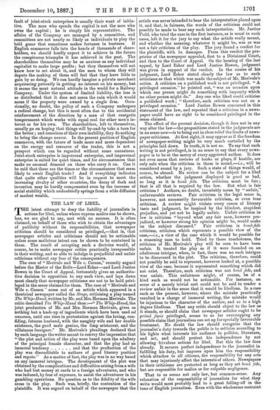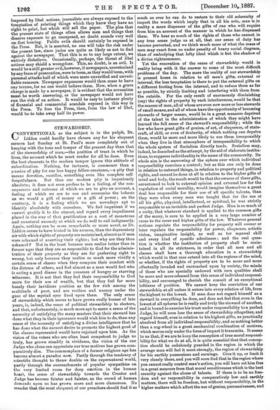THE LAW OF LIBEL.
THE latest attempt to deny the liability of journalists in actions for libel, unless where express malice can be shown, has, we are glad to say, met with no success. It is often claimed, on behalf of those who wish to obtain the advantages of publicity without its responsibilities, that newspaper criticism should be considered as privileged,—that is, that newspaper articles and criticisms should not be actionable unless some malicious intent can be shown to be contained in them. The result of accepting such a doctrine would, of course, be to make newspaper critics practically irresponsible in their writing, and so able to indulge in prejudicial and unfair criticisms without any fear of the consequences. The case of "Merivale and Wife v. ()arson," recently argued before the Master of the Rolls—Lord Esher—and Lord Justice Bowen in the Court of Appeal, fortunately gives an authorita- tive decision in opposition to any each view, and lays down most clearly that newspaper criticisms are not to be held privi- leged in the sense claimed for them. The case of "Merivale and Wife v. Carson" arose out of an article which appeared in a theatrical newspaper called the Stage, criticising a play named The Whip-Hand, written by Mr. and Mrs. Herman Merivale. The critic described The Whip-Eland thus :—" The Whip-land, the joint production of Mr. and Mrs. Herman Merivale, gives us nothing but a hash-up of ingredients which have been used ad nauseam, until one rises in protestation against the loving, con- fiding, fatuous husband, with the naughty wife and her double existence, the good male genius, the limp aristocrat, and the villainous foreigner." Mr. Merivale's pleadings declared that by such language the writer meant to convey the impression that "the plot and action of the play were based upon the adultery of the principal female character, and that the play had an immoral tendency and that the production of the play was discreditable to authors of good literary position and repute." As a matter of fact, the play was in no way based on any immoral intrigue. The development of the plot was obtained by the complications and difficulties arising from a wife who had lost money at cards to a foreign adventurer, and who WBB induced, by fear of exposure, to assist the adventurer in his gambling operations. No question as to the fidelity of the wife arose in the play. Such was, briefly, the contention of the plaintiffs. It was argued on behalf of the newspaper that the article was never intended to bear the interpretation placed upon it, and that, in fairness, the words of the criticism could not possibly be made to bear any such interpretation. Mr. Justice Field, who tried the case in the first instance, as is usual in such cases, left it for the jury to say what the article really meant, and whether the meaning, whatever it might be, WM or was not a fair criticism of the play. The jury found a verdict for the plaintiffs, with Is. damages. From this verdict the pro- prietor of the newspaper appealed, first to a Divisional Court, and then to the Court of Appeal. On the hearing of the last appeal, by Lord Ether and Lord Justice Bowen, judgment was given in support of the verdict. In the course of his judgment, Lord Esher stated clearly the law as to such criticisms as that which was made the subject of Mr. Merivale's action. A criticism on a published work is not privileged. "A privileged occasion," he pointed out, "was an occasion upon which one person might do something with impunity which no other person might do." Any one who liked could criticise a published work ; "therefore, such criticism was not on a privileged occasion." Lord Justice Bowen concurred in this statement of the law, and repeated that a criticism in a news- paper could have no right to be considered privileged in the sense claimed.
The effect of the present decision, though it does not in any way alter the law—the propositions stated in the judgments are in no sense new—is to bring out in clear relief the limits of news- paper criticisms. At first sight, it may appear as if the freedom of newspaper-writing might be very much curtailed by the principles laid down. In truth, it is not so. To say that such. writing is not privileged, is in no sense to say that every news- paper is to be at the mercy of every aggrieved author. It does not even mean that reviews of books or plays, if hostile, are only safe when the criticism in them is sound,—i.e., will be considered sound by a jury. Such a state of things would, of course, be absurd. No review can be the subject for a libel action, whether the judgment displayed is good or bad, so long as it is bond fide. The criticism must be fair ; that is all that is required by the law. But what is fair criticism Authors, no doubt, invariably mean by "unfair," unfavourable reviews. Fair criticism in the legal sense Is, however, not necessarily favourable criticism, or even true criticism. A review might violate every canon of literary taste and judgment, be inspired by the blindest, stupidest prejudice, and yet not be legally unfair. Unfair criticism in law is criticism "beyond what any fair man, however pre- judiced, or however strong his opinion might be, would make on the subject discussed." Fair criticism is bondfide criticism, criticism which represents a possible view of the case,--f.e., a view of the case which it would be possible for a reasoning man to hold. Tried by these touchstones, the criticism of Mr. Merivale's play will be seen to have been unfair. It treated the play as if it were founded on an adulterous intrigue, when, in fact, there was no such intrigue- to be discovered in the plot. The criticism therefore, could. not possibly be said to represent, however looked at, a possible. view of the case, because it represented something which did. not exist. Therefore, such criticism was not bond fide, and was unfair. This unfairness might, of course, be of a kind such as would not be actionable. For instance, an error of a merely trivial sort could not be said to render a review unfair in the sense that it would be libellous. In a case such as the present, however, where the mistake practically resulted in a charge of immoral writing, the mistake would be injurious to the character of the author, and so in a high degree libellous. That any critic should object to the law as it stands, or should claim that newspaper articles ought to be prima facie privileged, seems to us far overstepping any possible claim that journalism can set up for specially favourable treatment. No doubt the law should recognise that the journalist's duty towards the public is to criticise according to his lights what interests his audience in politics, literature, and art, and should protect his independence by not allowing frivolous actions for libel. But this the law does already. It secures perfect independence to the journalist in fulfilling his duty, but imposes upon him the responsibility which attaches to all citizens, the responsibility for any acts that may injuriously affect the interests of others. Newspapers in their criticisms are protected as long as they act bond fide, but are responsible for malice or for culpable negligence.
That to us seems not only law, but common-sense. Any relaxation of the responsibility of journalists for what they write would most probably lead to a great falling-off in the tone of English journalism. Even with the wholesome restraint
imposed by libel actions, journalists are always exposed to the temptation of printing things which they know they have no right to print, but which will sell the paper. The plea that the present state of things often allows men and things that deserve exposure to go unexposed, no doubt sounds very well on first hearing. Public evils should certainly be exposed in the Press. But, it is asserted, no one will take the risk under the present law, since jades are quite as likely as not to find against the newspaper. That this is so to any large extent, we entirely disbelieve. Occasionally, perhaps, the threat of libel actions may shield a wrongdoer. This, no doubt, is an evil. It would be a still greater evil,however, if newspaper's, unrestrained by any fears of prosecution, were to teem, as they would teem, with personal attacks half of which were mere unverified and unveri- fiable rumours. Newspaper exposures would then cease to have any terrors, for no one would believe them. Now, when a grave charge is made by a newspaper, it is evident that the accusation must be worth answering, or the newspaper would not have run the risk of an action. It would be easy to instance plenty of financial and commercial scandals exposed in this way in the Press. To free the Press, then, from the law of libel, mould be to take away half its power.























































 Previous page
Previous page